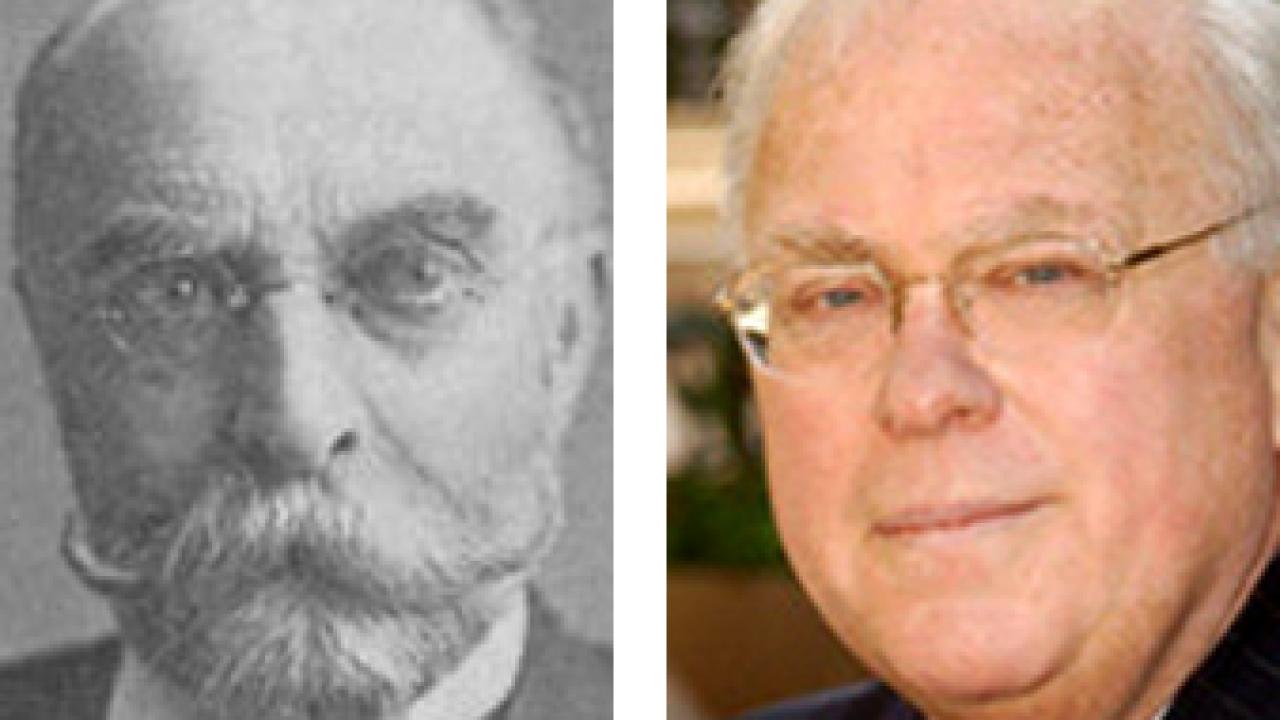RMI HISTORICAL BOOK SERIES
Proceeds benefit RMI programs. Here are the first three books in the series:
- The California Vegetables in Garden and Field, Edward Wickson ($60, special price at the June 11 event)
- Cheddar Cheese Making and Elements of Dairying, John Wright Decker ($60)
- California's Olive Pioneers: Early Essays on Olives & Olive Oil ($75)
- The Wine Press and The Cellar, by Emmet Hawkins Rixford ($50)
All four books will be available as a package, $200 (a savings of $45).
The books are available through the UC Davis Store; if you are shopping online, search for “Robert Mondavi Institute.”
This article originally appeared June 1 in advance of the Kevin Starr lecture. With this update, we are adding a video of the lecture.
By Dateline staff
Edward Wickson’s name crops up often in UC’s agricultural history, including the early development of the University Farm (which would become UC Davis). Kevin Starr’s name crops up often as a California historian — one who served as a visiting professor at UC Davis in 1985.
Starr is due back at UC Davis on Monday, June 11, to give a talk about Wickson. The program is free and open to the public. See registration details below.
The Robert Mondavi Institute for Wine and Food Science is hosting Starr, the California librarian emeritus, in connection with the release of Wickson’s The California Vegetables in Garden and Field (first published in 1897) as the fourth volume in the RMI’s Historical Agriculture Book Series.
Starr’s lecture topic: “Edward Wickson, Progressivism and the Enterprise of California Agriculture.”
It all happens Monday, June 11, at the Conference Center. Starr’s talk is from 4 to 5 p.m., and a reception will be from 5 to 6:30 p.m. The Wickson book will be for sale ($85), and Starr — who wrote the foreword for the new edition — will sign copies.
Starr is the author of Americans and the California Dream.and six subsequent Dream volumes, each covering a different era of California history. He received the National Endowment for the Humanities Medal in 2006.
He was California librarian from 1994 to 2004, and now serves as a University Professor in the history department at the University of Southern California.
Wickson, born in New York in 1868 and a graduate of Hamilton College in that state, came west before California had become the nation’s produce king. “Back in 1875, nobody knew what California was good for besides wheat, barley, cattle and mission wine,” Martinez pear grower Frank Swett would later recall, according to a UC Davis Magazine article on the Wickson Hall namesake.
“But farmers were beginning to experiment with planting different varieties of fruits, as well as vegetables and nuts — and they had lots of questions,” Kathleen Holder, the magazine’s managing editor, wrote in “Namesakes.” “Wickson, in his dual role as editor of the Pacific Rural Press weekly farm newspaper and a UC agriculture faculty member, was in a unique position to provide them with answers.
“The son of a butcher-turned-Presbyterian minister, Wickson became an evangelist for scientific agriculture — spreading the work of UC and other researchers through articles, pamphlets and now-classic books, distributing new varieties of seed and organizing a ‘demonstration train’ that in 1908-12 brought university experts to farmers throughout the state.”
Wickson worked on the Berkeley campus — the only UC at the time. He was acting dean of agriculture when he was appointed in 1905 to review dozens of proposed sites for the University Farm. Then, as dean of agriculture from 1907 to 1913, he oversaw the farm’s development at Davis.
He served as editor of the widely read Pacific Rural Press (a predecessor to California Farmer magazine) for 50 years. By the time of his death in 1923, his “fertile brain and facile pen (had) touched every branch of agriculture,” said his UC colleague Thomas Hunt. “When Wickson came, California was a mining camp. It is now a fruit and flower farm.”
The June 11 program starts with the lecture (4 p.m.) and concludes with the reception (5-6:30 p.m.) at the Conference Center. Admission is free, but the organizers are asking people to register in advance. Two online registration systems are in place, one for the lecture and one for the reception; if you are planning to attend both, you will need to register on both systems.
Media Resources
Dave Jones, Dateline, 530-752-6556, dljones@ucdavis.edu
